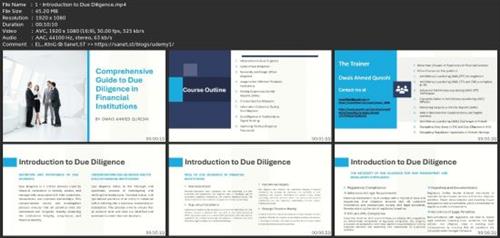- Thread Starter
- #1
Guide To Due Diligence In Financial Institutions

What you'll learn
Definition and Importance of Due Diligence
Types of Due Diligence: CDD, SDD, EDD
Legal and regulatory requirements for due diligence
Usage Under Different Financial Institutions
Requirements
No experience required
The course is for all anti money laundering and due diligence officers
Description
This course covers the various types of due diligence, its necessity, application in different financial institutions, and its pivotal role in KYC (Know Your Customer) and raising Suspicious Activity Reports (SARs). Additionally, we will delve into the evolving landscape of due diligence from traditional banking services to the digital era, offering practical insights and best practices for compliance officers and due diligence officers.Course OutlineIntroduction to Due DiligenceDefinition and Importance of Due DiligenceUnderstanding due diligence and its role in financial institutions.The necessity of due diligence for risk management and regulatory compliance.Types of Due DiligenceCustomer Due Diligence (CDD)Enhanced Due Diligence (EDD)Simplified Due Diligence (SDD)Ongoing MonitoringNecessity and Usage of Due DiligenceNecessity of Due DiligenceLegal and regulatory requirementsRisk assessment and managementPrevention of financial crimes (money laundering, fraud, terrorism financing)Usage Under Different Financial InstitutionsApplication in banks, investment firms, insurance companies, and fintech startups.Specific requirements for each type of financial institution.Due Diligence and KYCDue Diligence in KYCRole of due diligence in verifying customer identity and assessing risks.How due diligence supports compliance with KYC regulations.Raising Suspicious Activity Reports (SARs)How due diligence leads to the identification of suspicious activities.Process of filing SARs and its importance in combating financial crimes.Conducting Due DiligenceWho Conducts Due Diligence?Roles and responsibilities of compliance officers, due diligence officers, and other relevant personnel.Coordination between different departments.Goals Behind Due DiligenceIdentifying and mitigating risks.Ensuring regulatory compliance.Protecting the integrity and reputation of the financial institution.Information Collection During Due DiligenceInformation Obtained During Due DiligenceCustomer identification and verification (documents, data sources).Financial background and transaction history.Purpose and nature of the business relationship.Due Diligence in Traditional vs. Digital BankingDue Diligence in Traditional Banking ServicesProcedures and best practices for face-to-face customer interactions.Documentation and verification processes.Due Diligence in the Digital EraChallenges and opportunities in digital due diligence.Use of technology and digital tools for remote customer verification.Effective Digital Due DiligenceStrategies for conducting due diligence without physical presence.Ensuring accuracy and compliance in a digital environment.Improving the Due Diligence FrameworkImprovements in Current Due Diligence FrameworkIdentifying gaps and challenges in existing practices.Recommendations for enhancing the effectiveness of due diligence processes.Insights for Compliance Officers and Due Diligence OfficersBest practices and practical tips for conducting efficient due diligence.Staying updated with regulatory changes and technological advancements.ConclusionSummarizing Key TakeawaysRecap of the critical aspects of due diligence.Emphasizing the importance of continuous improvement and vigilance.Final Thoughts and Next StepsEncouraging ongoing learning and professional development.Resources for further reading and skill enhancement.
Overview
Section 1: Introduction
Lecture 1 Introduction to Due Diligence
Section 2: Types of Due Diligence
Lecture 2 Lecture 2
Section 3: Necessity of Due Diligence
Lecture 3 Lecture 3
Section 4: Usage of Due Diligence Under Different Financial Institutions
Lecture 4 Lecture 4
Section 5: Comprehensive Lecture on Due Diligence and KYC
Lecture 5 Lecture 5
Section 6: Raising Suspicious Activity Reports (SARs)
Lecture 6 Lecture 6
Section 7: Comprehensive Lecture on Conducting Due Diligence
Lecture 7 Lecture 7
Section 8: Goals Behind Due Diligence
Lecture 8 Lecture 8
Section 9: Information Collection During Due Diligence
Lecture 9 Lecture 9
Section 10: Due Diligence in Traditional vs. Digital Banking
Lecture 10 Lecture 10
Section 11: Due Diligence in the Digital Era
Lecture 11 Lecture 11
Section 12: Effective Digital Due Diligence
Lecture 12 Lecture 12
Section 13: Improving the Due Diligence Framework
Lecture 13 Lecture 13
Section 14: Insights for Compliance Officers and Due Diligence Officers
Lecture 14 Lecture 14
Section 15: Conclusion of Due Diligence Course
Lecture 15 Lecture 15
For Anti money laundering officers/ AML field,This course is designed for compliance related officer,Compliance officers, due diligence officers, sales officers

rapidgator.net:
nitroflare.com:

Published 8/2024
MP4 | Video: h264, 1920x1080 | Audio: AAC, 44.1 KHz
Language: English | Size: 497.33 MB | Duration: 2h 16m
Guide to Due Diligence in FIs, CDD, EDD and SDD, Digital banking services, Digital verification of Customers.
MP4 | Video: h264, 1920x1080 | Audio: AAC, 44.1 KHz
Language: English | Size: 497.33 MB | Duration: 2h 16m
Guide to Due Diligence in FIs, CDD, EDD and SDD, Digital banking services, Digital verification of Customers.
What you'll learn
Definition and Importance of Due Diligence
Types of Due Diligence: CDD, SDD, EDD
Legal and regulatory requirements for due diligence
Usage Under Different Financial Institutions
Requirements
No experience required
The course is for all anti money laundering and due diligence officers
Description
This course covers the various types of due diligence, its necessity, application in different financial institutions, and its pivotal role in KYC (Know Your Customer) and raising Suspicious Activity Reports (SARs). Additionally, we will delve into the evolving landscape of due diligence from traditional banking services to the digital era, offering practical insights and best practices for compliance officers and due diligence officers.Course OutlineIntroduction to Due DiligenceDefinition and Importance of Due DiligenceUnderstanding due diligence and its role in financial institutions.The necessity of due diligence for risk management and regulatory compliance.Types of Due DiligenceCustomer Due Diligence (CDD)Enhanced Due Diligence (EDD)Simplified Due Diligence (SDD)Ongoing MonitoringNecessity and Usage of Due DiligenceNecessity of Due DiligenceLegal and regulatory requirementsRisk assessment and managementPrevention of financial crimes (money laundering, fraud, terrorism financing)Usage Under Different Financial InstitutionsApplication in banks, investment firms, insurance companies, and fintech startups.Specific requirements for each type of financial institution.Due Diligence and KYCDue Diligence in KYCRole of due diligence in verifying customer identity and assessing risks.How due diligence supports compliance with KYC regulations.Raising Suspicious Activity Reports (SARs)How due diligence leads to the identification of suspicious activities.Process of filing SARs and its importance in combating financial crimes.Conducting Due DiligenceWho Conducts Due Diligence?Roles and responsibilities of compliance officers, due diligence officers, and other relevant personnel.Coordination between different departments.Goals Behind Due DiligenceIdentifying and mitigating risks.Ensuring regulatory compliance.Protecting the integrity and reputation of the financial institution.Information Collection During Due DiligenceInformation Obtained During Due DiligenceCustomer identification and verification (documents, data sources).Financial background and transaction history.Purpose and nature of the business relationship.Due Diligence in Traditional vs. Digital BankingDue Diligence in Traditional Banking ServicesProcedures and best practices for face-to-face customer interactions.Documentation and verification processes.Due Diligence in the Digital EraChallenges and opportunities in digital due diligence.Use of technology and digital tools for remote customer verification.Effective Digital Due DiligenceStrategies for conducting due diligence without physical presence.Ensuring accuracy and compliance in a digital environment.Improving the Due Diligence FrameworkImprovements in Current Due Diligence FrameworkIdentifying gaps and challenges in existing practices.Recommendations for enhancing the effectiveness of due diligence processes.Insights for Compliance Officers and Due Diligence OfficersBest practices and practical tips for conducting efficient due diligence.Staying updated with regulatory changes and technological advancements.ConclusionSummarizing Key TakeawaysRecap of the critical aspects of due diligence.Emphasizing the importance of continuous improvement and vigilance.Final Thoughts and Next StepsEncouraging ongoing learning and professional development.Resources for further reading and skill enhancement.
Overview
Section 1: Introduction
Lecture 1 Introduction to Due Diligence
Section 2: Types of Due Diligence
Lecture 2 Lecture 2
Section 3: Necessity of Due Diligence
Lecture 3 Lecture 3
Section 4: Usage of Due Diligence Under Different Financial Institutions
Lecture 4 Lecture 4
Section 5: Comprehensive Lecture on Due Diligence and KYC
Lecture 5 Lecture 5
Section 6: Raising Suspicious Activity Reports (SARs)
Lecture 6 Lecture 6
Section 7: Comprehensive Lecture on Conducting Due Diligence
Lecture 7 Lecture 7
Section 8: Goals Behind Due Diligence
Lecture 8 Lecture 8
Section 9: Information Collection During Due Diligence
Lecture 9 Lecture 9
Section 10: Due Diligence in Traditional vs. Digital Banking
Lecture 10 Lecture 10
Section 11: Due Diligence in the Digital Era
Lecture 11 Lecture 11
Section 12: Effective Digital Due Diligence
Lecture 12 Lecture 12
Section 13: Improving the Due Diligence Framework
Lecture 13 Lecture 13
Section 14: Insights for Compliance Officers and Due Diligence Officers
Lecture 14 Lecture 14
Section 15: Conclusion of Due Diligence Course
Lecture 15 Lecture 15
For Anti money laundering officers/ AML field,This course is designed for compliance related officer,Compliance officers, due diligence officers, sales officers
Screenshots

rapidgator.net:
You must reply in thread to view hidden text.
nitroflare.com:
You must reply in thread to view hidden text.
